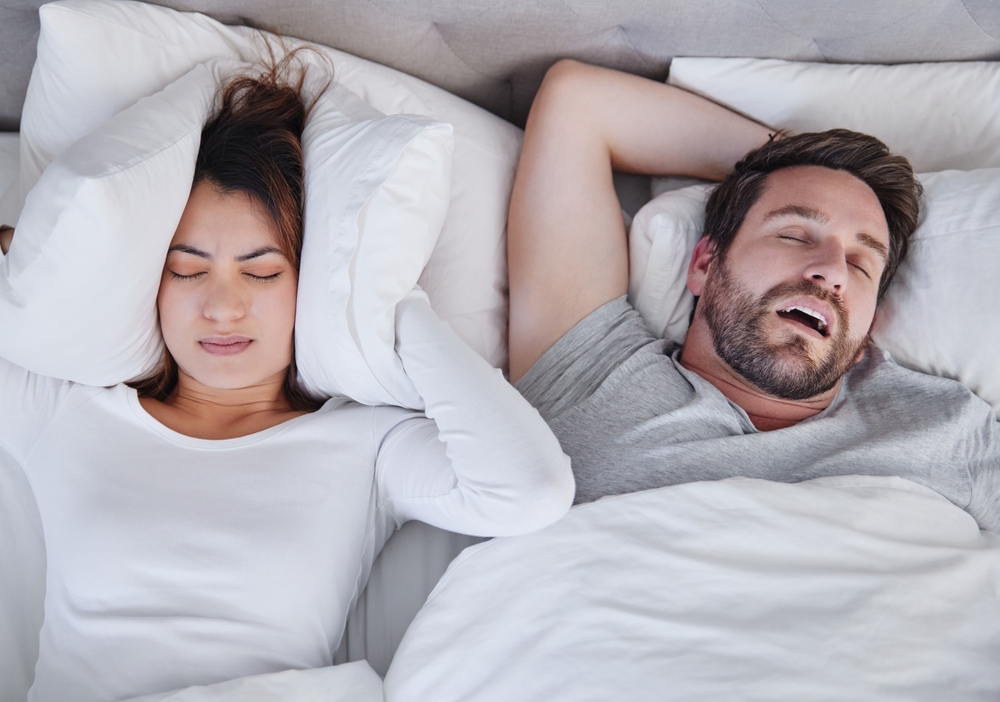Posted by: Maryland ENT in General
Do you snore frequently? Are you often sleepy?
Snoring can disrupt peaceful nights and affect your and your partner’s sleep. If you snore often, feel sleepy regularly, or snore so loudly that it disturbs your partner’s slumber, there are ways to find relief. Keep reading to find out if coblation is an effective method of treating snoring!
What is Snoring?

Snoring is the rumbling, whistling, rattling, or snorting sound made as you sleep. It can occur when there’s an obstruction in your airway.
During sleep, the throat muscles, soft palate, and tongue relax. They may fall backward and obstruct or block your airway if they relax too much.
The obstruction squeezes air through these relaxed tissues, causing them to vibrate. When this vibration happens, it produces a snoring sound.
The greater the obstruction, the louder the snoring. Almost everyone snores from time to time.
However, it can be a persistent problem for some people. Sometimes, snoring could indicate a more serious sleep disorder called sleep apnea.
If you snore loudly, your ENT specialist at Maryland ENT may order a sleep study to rule out sleep apnea. Untreated sleep apnea can increase your risk for diabetes, high blood pressure, stroke, heart attack, and other serious health conditions.
If you snore and feel sleepy frequently without sleep apnea, a treatment called coblation can help control your snoring.
What is Coblation?
Coblation is a minimally invasive, highly effective procedure that treats snoring. Radiofrequency (RF) technology tightens and reduces soft palate tissues to minimize snoring.
How Does Coblation Work?

The procedure begins with numbing your mouth with local anesthesia. Next, your ENT specialist will insert a needle-like device into your soft palate.
The device delivers controlled, low-temperature radiofrequency energy to form about three channels in the soft palate’s tissue. Low-temperature radiofrequency energy safely heats target tissue and preserves surrounding healthy tissue.
The channels created with radiofrequency energy cause a certain amount of damage, stimulating your body’s natural response to form scar tissue. Scar tissue stiffens and shrinks the soft palate during healing, decreasing its ability to vibrate as much as it did before coblation.
Consequently, this minimizes the intensity and sound of snoring. The quick, in-office procedure performed in-office at Maryland ENT takes less than 30 minutes to complete.
What Should You Expect During Recovery?
Coblation preserves surrounding healthy tissue, allowing for an easy and fast recovery. Most patients can safely drive themselves home and return to their regular activities and routine the same day.
Post-Procedure Instructions
Your ENT specialist will provide detailed post-op instructions, including follow-up appointments. They’ll also prescribe antibiotics. Carefully follow all instructions to ensure you’re healing correctly and can quickly manage potential complications.
Mild Pain
Expect mild discomfort and pain in the soft palate following your procedure. You might also feel some pain in the throat, jaw, and ears due to the close proximity of these structures to the soft palate.
Additionally, your throat may be sore for a few days. Your ENT specialist at Maryland ENT will prescribe antibiotics and medication to aid inflammation and pain.
Sucking on ice cubes can also help with the pain. You can do this several times a day.
Bleeding
Minor bleeding might occur in the first 24 hours. If the amount of blood increases or the bleeding doesn’t stop, contact your ENT specialist.
Swelling
Expect some swelling in the throat or palate area. You might experience a sense of fullness at the back of your throat for several days. Applying an ice pack to the neck can help alleviate swelling.
Diet
Drinking lots of fluids can prevent dehydration and ease throat soreness, so you stay healthy. Also, eat soft foods for about 4 to 5 days because of difficulty swallowing and pain. Soft foods are gentle on the soft palate tissue and throat.
Avoid hard, dried, hot, and spicy foods, which can cause pain and discomfort. To help keep the wound clean, you’ll need to gargle with saline for about a week after each meal.
Activities
While you can resume your routine, limit strenuous activities for a day or two after your procedure, as they can cause increased bleeding and swelling.
Sleeping
For a few nights after the coblation procedure, sleep with your head on 2 to 3 pillows. This minimizes swelling and improves breathing.
Oral Products
Avoid lozenges, mouthwash, and throat spray. They may contain alcohol that can irritate soft palate tissue.
How Effective is Coblation for Snoring?

Swelling can cause increased snoring following your coblation procedure. However, as it goes down, most patients notice a considerable reduction in snoring intensity within 1 to 4 weeks.
Improvements can continue for up to six weeks. It’s common to see the most significant improvement in snoring after week 6.
Clinical studies back the effectiveness of coblation. Studies showed a significant reduction in snoring, as reported by both their partner and the patient. The follow-up duration ranged from 4 weeks to 30 months.
Who is a Good Candidate for Coblation?
You may be a good candidate for coblation if you meet the following requirements:
- You snore frequently
- You’re in good health
- You have mild to moderate snoring
End Noisy Nights with Coblation
Coblation at Maryland ENT may offer years of relief if you’re struggling with snoring and sleepiness. This innovative treatment is fast, causes minimal discomfort, and is highly effective.
Are you looking for a solution for your snoring? Request your appointment today at Maryland ENT in Lutherville and Baltimore, MD, to take the first step towards a good night’s sleep for you and your partner. Isn’t it time to stop snoring and sleep better?



